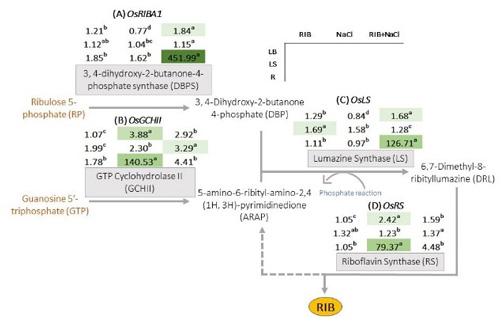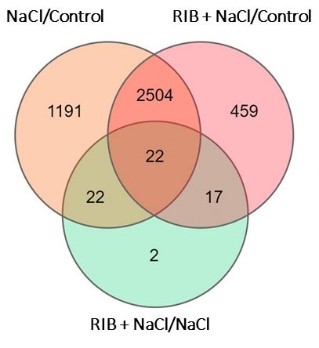Professor Akihiro UEDA
School of Applied Biological Science, Hiroshima University
E-mail:akiueda*hiroshima-u.ac.jp (Note: Please replace *with @)
Key points of this research
- VB2 pretreatment to rice seedlings improves salinity tolerance in rice
- VB2 has a scavenging ability of reactive oxygen species generated by salinity stress
- VB2 priming induces expression of the genes related to VB2 biosynthesis and Na transport
Content of research
Salinized soils are generated by excessive salts accumulation in arid and coastal areas around the world. Because crop productivity is seriously decreased in salinized soils, creation of salinity tolerant crop cultivars by molecular breeding is expected to solve this problem. In this study, we aimed to assess whether VB2 pretreatment to seedlings can improve salinity tolerance in rice and to investigate molecular mechanisms of VB2-mediated salinity tolerance.
Seedlings of an indica rice cultivar IR29, which is salinity-sensitive, were treated with VB2 for 24 hours, then grown under salinity stress (50 mM NaCl) conditions. As a result, we found that VB2 treatment increases biomass production and ameliorates cell membrane damages caused by generation of reactive oxygen species in rice under salinity stress. In vitro experiment revealed that VB2 has a scavenging ability of reactive oxygen species. Also, exogenous VB2 application highly induced expression of the genes related to endogenous VB2 biosynthesis, which may facilitate VB2 accumulation in rice. Transcriptome analysis identified that expression of numerous genes related to Na transporters and novel functions is governed by VB2.
We have already reported that seed priming with VB2 can effectively improve salinity tolerance in rice (Jiadkong et al. (2022), J. Plant Growth Regulation). In the future, seed priming and seedling priming with VB2 can be combined to develop new cultivation techniques, without relying on molecular breeding, to further improve salinity tolerance in rice during the initial growth stage.
This research was supported by JSPS KAKENHI grant number 20KK0129.

Expression of the genes related to VB2 biosynthesis in plants.

Number of the genes whose expressions are affected by VB2 and salinity treatment.
Information details of publication
- Journal: Plant Science
- Title: Exogenous riboflavin (vitamin B2) application enhances salinity tolerance through the activation of its biosynthesis in rice seedlings under salinity stress
- Authors: Kamonthip Jiadkong, Anisa Nazera Fauzia, Nobuo Yamaguchi, Akihiro Ueda
- DOI: https://doi.org/10.1016/j.plantsci.2023.111929


 Home
Home

